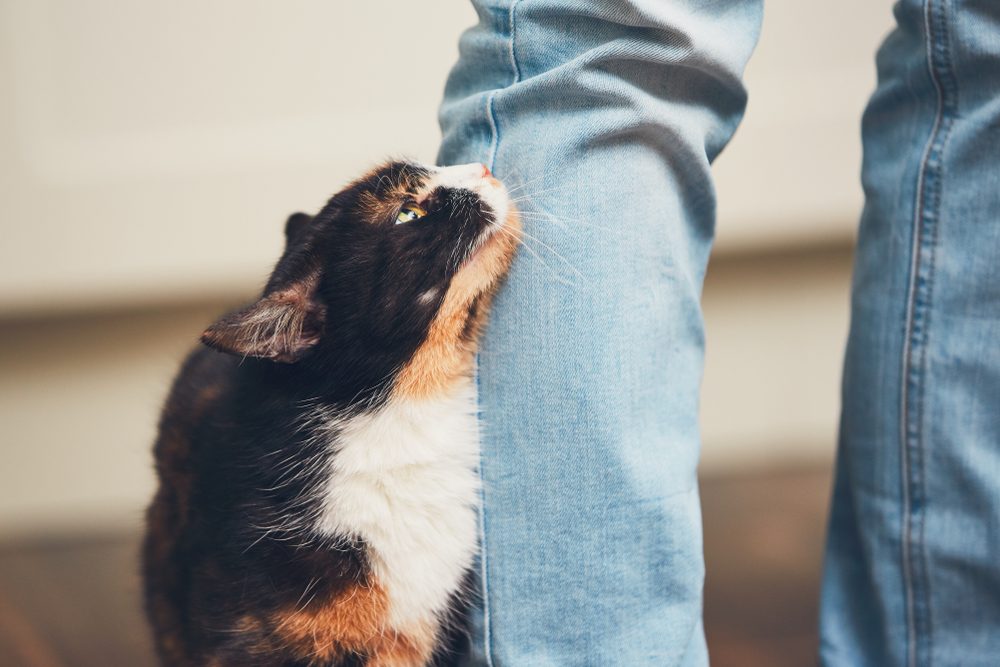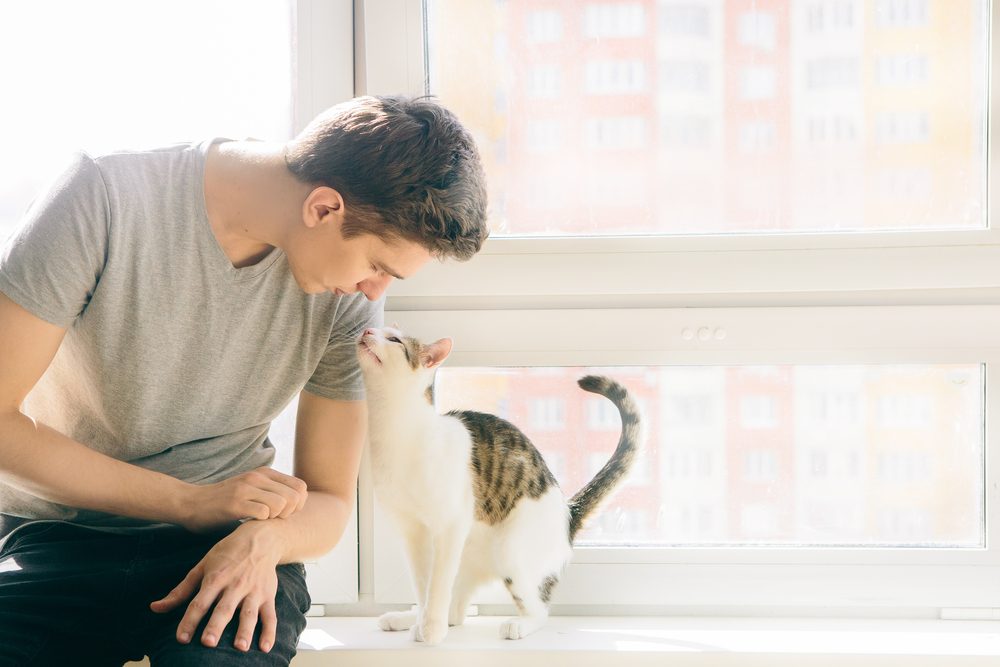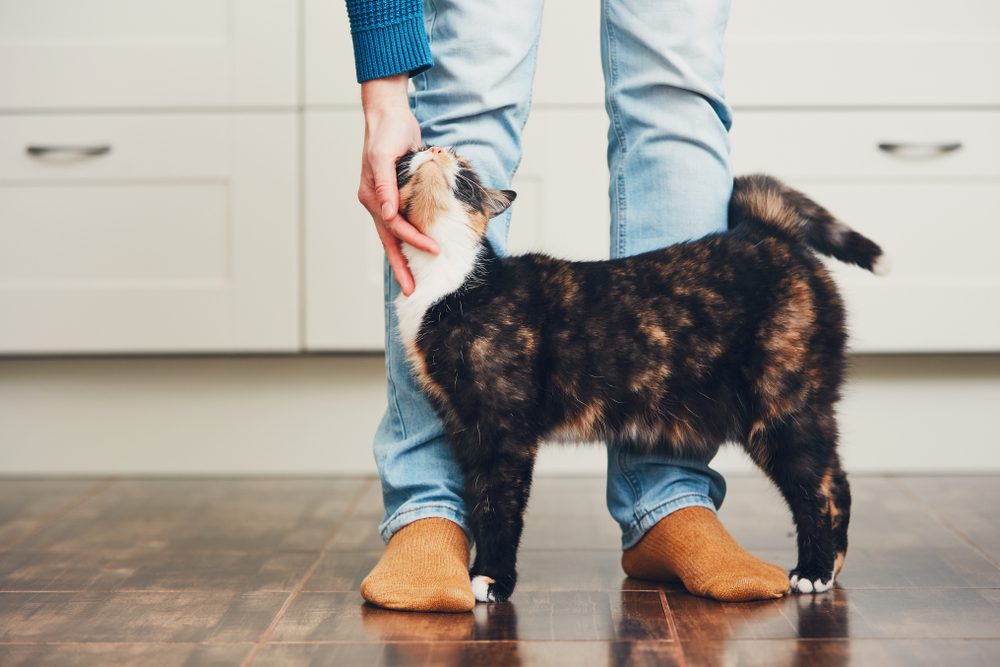From chattering loudly when they want food to chasing after plastic bags, our cats sometimes exhibit certain behaviors that are more than a little unusual. Some cats are naturally timid, while others (like Calicos and Torties) are known for their feisty attitude. With so much naturally occurring diversity in the species, it can be difficult to say which behaviors are odd and which can be attributed to “cats being cats.” But have you ever wondered, “Why does my cat follow me everywhere?” We’ll explore what this (admittedly adorable) behavior means–and why it might be something you should worry about.

Do cats have a favorite person?
To ensure your kittens grow up to be well-adjusted adults, it’s best to make sure they receive proper socialization when they’re young. That being said, even the most well-socialized kittens tend to have a favorite family member. Whether a cat’s favorite human is a pet parent or one of the children, how cats elect their person of choice may initially seem random, but the experts say it’s not so mysterious after all. Like us, sometimes they just gravitate toward certain personalities more than others. Union Lake Veterinary Hospital’s vets suggest getting to know your cat’s personality and matching it if you want to get closer to your frisky feline.
Why does my cat follow me and no one else?
For some pet parents, they would rather let someone else be the favorite for once. You love your cat, but having her constantly underfoot is annoying at best and a recipe for a fall at worst. And if Miss Mittens recently began following you into the shower, you’re probably feeling unnerved by her sudden interest in your bathing routine. Here are a few reasons why your cat might follow you, and only you, around the house.
Your cat trusts you
If you’ve had your cat since she was a small kitten, it’s possible she’s always followed you around. Cats who have been properly socialized are much more trusting of humans, especially their humans. Former strays, on the other hand, have a more difficult time trusting humans. If your rescue cat follows you and no one else, it’s a good sign she trusts you, but she just isn’t ready to trust other family members.
Your cat has formed a strong attachment to you
You probably refer to your cat as your fur baby, but did you know cats and toddlers actually have a great deal in common when it comes to their attachment styles? According to research conducted by Claudia Edwards, “cats can manifest attachment behaviors toward their owners” that resemble the attachment behaviors of 1- to 2-year-old children.
Your cat loves you a lot
While dogs tend to be motivated by food, cats aren’t quite as meal-centric as their canine counterparts. According to a study conducted by Oregon State University scientists, cats even prefer spending time with their favorite humans to eating. It’s possible your cat follows you everywhere because she loves you and wants to spend as much time with you as she possibly can.

Why has my cat become so clingy?
You may find it charming when your formerly aloof cat begins following you from room to room. Unfortunately, it can be your cat’s way of letting you know that something is wrong. Here are a few worrisome reasons your cat may be following you around the house all of a sudden:
Your cat is ill
From a minor stomach issue to something more serious, any illness has the potential to cause your feline fur baby to become clingy. Your cat loves you, and being in your presence is comforting to her when she doesn’t feel well. It’s time for a trip to the vet if your formerly independent cat suddenly wants to follow you everywhere, especially if this new behavior is accompanied by additional symptoms.
Your cat can’t see as well as she used to
Just like us, cats can suffer from age-related vision loss. Injuries and illness have also been shown to cause blindness in cats, but you may not realize your fur baby is losing her sight unless there’s visible evidence. Sudden clumsiness, increased vocalizations, reluctance to play, and clinginess can all indicate that your cat’s vision is failing.
Your cat is stressed out
Some life changes, such as a new baby, a move, or a death in the family, are universally recognized as major life changes. However, cats are sensitive, so even something as simple as remodeling your bathroom can leave your fur baby unsettled. If you suspect your cat is feeling anxious, look for symptoms like urinating or defecating outside the litter box, behavioral changes, or loss of appetite.

Final thoughts
The notion of your cat following you everywhere is cute in theory, but the reality is that something could be wrong with your fur baby. Whether she’s anxious because of a new pet or she has an underlying physical ailment, your cat’s behavior is her way of communicating with you. Cats can’t tell us what they need using words, so they rely on vocalizations and body language to express their needs. Don’t hesitate to contact your vet if your cat exhibits sudden physical or mental changes. A checkup never hurts, and most of us don’t take our cats to the vet often enough. And if it’s just how your cat has always been, well, congrats on being her chosen human!




